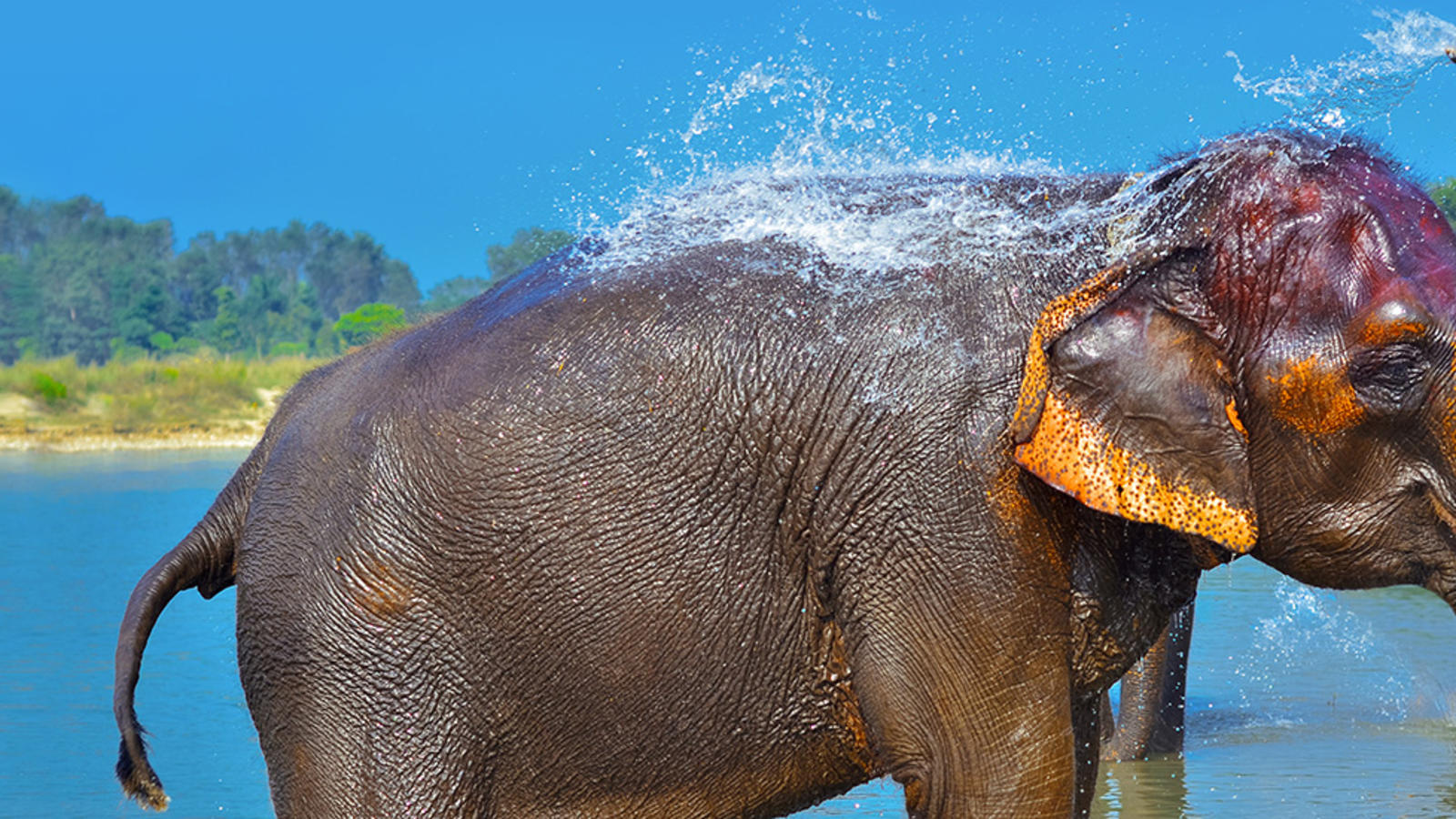
Giant Steps
From Investment Banking To Protecting Wildlife, With A Lifetime Of Skills
By Mary Lee Grant
From Investment Banking To Protecting Wildlife, With A Lifetime Of Skills
Natsuyo Jaeke led her blind elephant into the River Kwai, just shoreward of the cool swift current that moved towards the mountains. The 58-year-old former Seattle banker side-stepped the elephant's feet and trunk, gently prodding her with a stick as she led her up the bank.
"I spent my entire career in banking, but I was one of those people who just wasn't passionate about my job," Jaeke said later. "I realized that what I loved was elephants."
Jaeke is one of a small but growing number of professional women who find working with the world's largest land mammal more rewarding than a traditional business career. Their passion echoes a rising awareness about elephants amid the general public: This winter, outcry against the misuse of elephants led to the recent closing of Ringling Bros. For Jaeke and at least a dozen other women caregivers, aiding elephants is the best use of emotional and management skills they have honed their whole lives.
Perhaps surprisingly, at least one business researcher thinks they're right.
"Sometimes we spend our lives acquiring more resources than we need, as we head in a direction we don't really want," said Scott Sonenshein, a professor at Rice business school and author of the new book Stretch: Unlock the Power of Less and Achieve More than You Ever Imagined. "People get on a career trajectory of moving on to the next thing of what is traditionally successful. It turns out not to be the life they wanted, but they continue to move towards the more impressive title and the bigger office."
As these Western woman mahouts know firsthand, it's possible to discover meaningful new work by simply taking advantage of leisure. Just slightly moving out of the familiar–even attending a conference in a new field–can open new horizons.
But it takes putting a higher priority on leisure–both individually and as a society. That doesn't seem to come easily. College-educated Americans have less leisure time than they did in the past, and actually spend fewer hours at recreational activities than those with only a high school education.
It was a serious approach to leisure, however, that inspired Jaeke to change her career, her life, and her home. Jaeke, who is Japanese-American, first began to visit Thailand on her vacations, volunteering at elephant sanctuaries.
Jaeke returned several times to Thailand as a tourist to hone her expertise in caring for and training elephants. Then, at a sanctuary called ElephantsWorld in Western Thailand, she fell in love, with a fragile, aging elephant named Lam Dam Duan that seemed to especially need her. Jaeke moved full-time to a nearby village, biking three miles each day to spend her time with the Lam Duan.
Another professional woman at ElephantsWorld already had made a similar choice. Agnes Tammenga, 56, grew up on a farm in the Netherlands. From the time she was a little girl, she dreamed of working with large wildlife, snipping pictures of tigers and elephants out of magazines. Though she married and pursued a career in the fast food industry, Tammenga never abandoned that childhood desire. In 2006, after decades of saving and planning, Tammenga moved to Thailand to help elephants abused by the tourist and logging industries.
Within weeks, she encountered an ailing elephant on a short chain, standing in the sun near the River Kwai. She organized a fundraiser to buy the elephant, whose name was Aun. Then she contacted Thai veterinarian Samart Prasitpon, who, she had heard, had begun to rescue elephants, too. She spoke no Thai, and he spoke no English. But somehow, they managed to launch a foundation.
Renting land in a lush mountain valley near the Burmese border, the pair eventually were able to hire 25 mahouts to tend 26 elephants on 51 acres. Today, hundreds of visitors arrive every month, as well as 100 volunteers every year.
This, too, reflects a little-appreciated ingredient for success both in work and in personal life, Sonenshein says. In our specialized era, it's easy to assume that a Seattle banker or Dutch restaurant worker wouldn't know enough about elephants to contribute much to a wildlife sanctuary. We demand formal qualifications.
Often, that sort of thinking is a mistake.
"We have to ask 'How might someone with other worldviews completely change the ways we think about working with these animals?'" Sonenshein said. "There are significant limitations to being an expert. Part of it is tunnel vision."
In fact, the very improvisation with which Tammenga and Samart achieved their goals — with few resources or even a common language — may have led to greater success, Sonenshein says.
Displacement and challenge can also forge resourcefulness, another ElephantsWorld volunteer found. After graduating with an economics degree from Queen's College in Ontario, Canada, Victoria Duffield planned to go to law school. But she took a break first, traveling through Asia to volunteer at wildlife sanctuaries. When she came to ElephantsWorld, she began training as a mahout.
She soon became smitten with an elderly, blind elephant named Bow and became the elephant's caretaker for three years. Bow needed medical attention and sometimes help during the night, so Duffield moved to a thatched-roof house adjoining the elephant infirmary, sometimes even sleeping beside the elephant.
It took time to gain respect from the young male mahouts, many of whom had learned to ride elephants before they could walk and grew up with elephant stables attached to their houses. But soon, Duffield's hard work and advancing knowledge earned their respect.
"Sometimes I feel like Wendy and the Lost Boys," said Duffield, 27. "They are my brothers, and we play and laugh and joke, and we support each other totally."
When Bow would collapse, as she did occasionally as her health failed, it was all hands on deck to help Duffield get her back on her feet. When Bow died several months ago, the elephant was buried with a full Buddhist ceremony — as are all elephants at the sanctuary. She was covered with blooming flowers and prayed over by chanting monks wafting incense into the hot jungle air.
Duffield found herself a long way from Ontario, Canada. Her life had revolved completely around Bow, and her next step was unclear. But she had found work she loved. She decided to stay on at ElephantsWorld and began to care for another blind elephant, Sri Tong. She is learning elephant foot care and says law school holds not a bit of interest. She plans now to apply to vet school, and perhaps start her own elephant sanctuary.
Mary Lee Grant is a freelance writer with a Ph.D. in comparative border studies. She completed the mahout training program at ElephantsWorld while teaching at the Hanoi University of Mining and Geology in Vietnam. She writes for Rice Business Wisdom. This article originally appeared in Gray Matters.
Never Miss A Story


